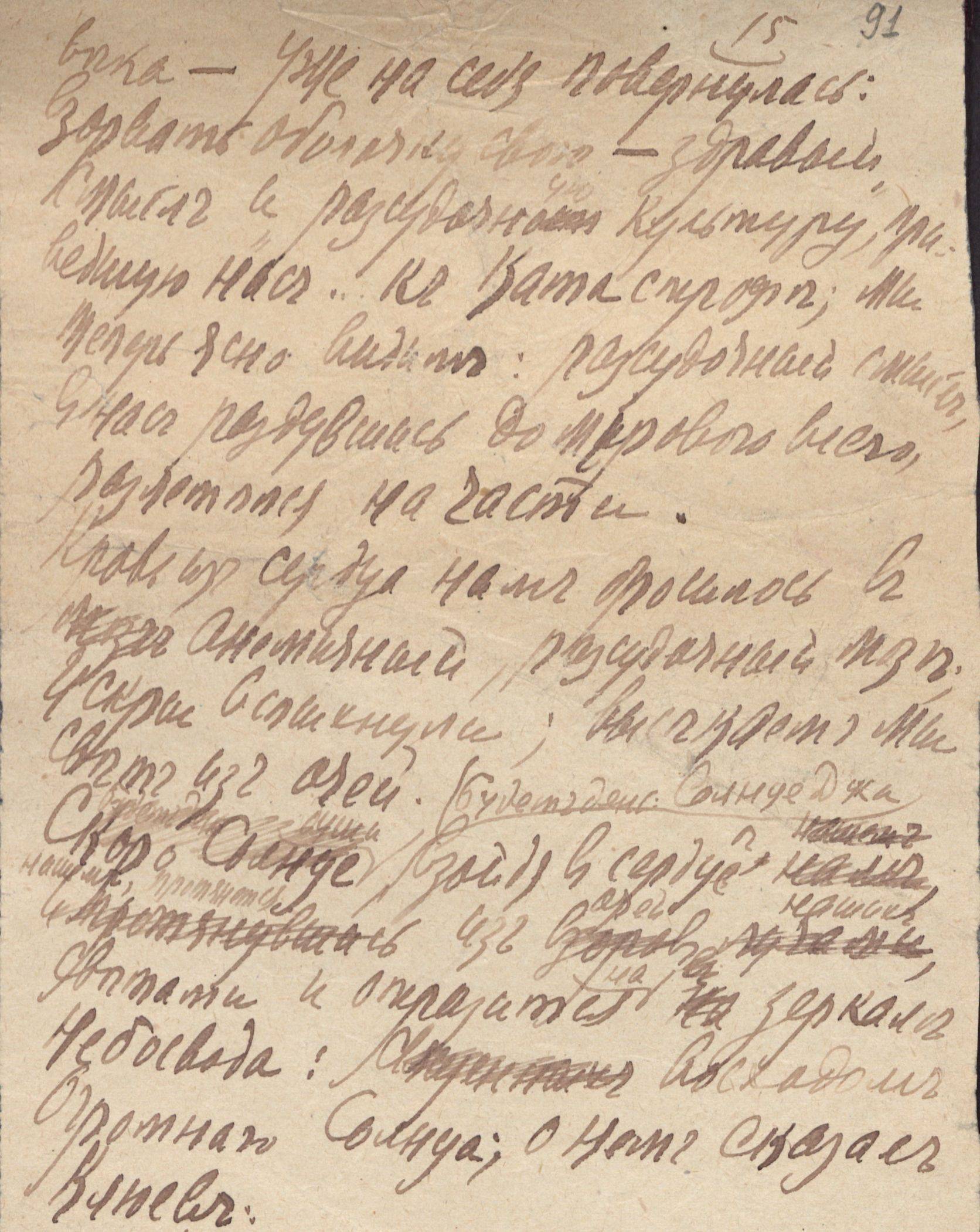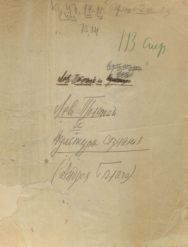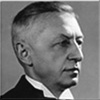Andrei Belyi’s “Vospominaniia strannogo Cheloveka"

Introduction, publication and comment by A. V. Lavrov
The “Drafts” section of the review entitled “Literaturnoe nasledstvo Andreia Belogo” and written in 1937 by K. N. Bugaeva, A. S. Petrovskii and D. M. Pines contains the following note: “U R. V. Ivanova: <…> “Vospominaniia strannogo cheloveka” [1919 g.?]. Chernovik “Zapisok chudaka”, nepolnyi, polulisty 21–47 i 57–183; konchaetsia glavkoi 41-i; na oborote ll. 162–176 s novoi paginatsiei idet prodolzhenie glavki 41-i”.[1] This information goes back to the description of Andrei Belyi’s handwritten and typewritten texts, which were deposited in R. V. Ivanov-Razumnik’s archive; there is also indicated the volume of “Vospominaniia strannogo cheloveka” manuscript: 153 half-pages.[2]
A particular significance of the given note lies in the fact that it was written when Ivanov-Razumnik’s archive was still intact. As is known, after the occupation of Pushkin (Tsarskoe Selo) by German troops Ivanov-Razumnik, who had been living there, was deported to Germany in the spring of 1942. The archive that remained in his flat unattended was being gradually ravaged and destroyed. When D. E. Maksimov came in August 1944 to the liberated city and visited the place where Ivanov-Razumnik had been living before he saw a terrible sight: the house “byl izurodovan i neobitaem. Steny i krysha ego sokhranilis’, no ni ram, ni dverei, ni pola ne bylo. <…> V domike Razumnika Vasil’evicha, v pustoi komnate, na goloi zemle, inache govoria, na tom meste, gde dolzhen byl byt’ pol, lezhala ogromnaia besformennaia gruda bumag, nabrosannykh v polnom besporiadke, kak na svalke, sputannykh i zapachkannykh”.[3] The remains of the archive were at the same moment transported to the Pushkin House. A great number of creative manuscripts and letters which were initially present in this collection, carefully kept by its owner, were irretrievably lost; other autographs were only partly saved or damaged. Among the latter are “Vospominaniia strannogo cheloveka”. Out of 153 half-pages (this term refers to the nonstandard paper format of the autograph: 19,5 cm wide and 39,5 cm long — i.e. narrow and long stripes) mentioned by Ivanov-Razumnik only 99 have been preserved in two archive units that contain the manuscript.[4] Therefore, just over a third of the text has gone missing. Considering the fact that a significant part of pages has only partly remained intact, in fragments, which can not occasionally be fully comprehended, we can infer that more than a third, or even 40%, of the text that was kept by Ivanov-Razumnik has been lost.
The conjectural dating of “Vospominaniia strannogo cheloveka”, which is indicated by the authors of the “Literaturnoe nasledstvo Andreia Belogo” review (1919 g.?), can be corrected. In his retrospective notes “Rakurs k dnevniku” Belyi dated the start of work on the text which would be published under the title “Zapiski chudaka” (in the first publication in “Zapiski mechtatelei”: ““Ia”. Epopeia. T. 1. Zapiski chudaka. Ch. 1. Vozvrashchenie na rodinu”) to the first months of 1919: “Delaiu chernovye nabroski “Zapisok Chudaka”” (February), “Mnogo pishu “Zapiski Chudaka”” (March), “Pishu “Zapiski Chudaka” <…> Chtenie “Zapisok Chudaka” u Grigorovykh” (April).[5] And later, after a several-month break: “… usilenno syznova pererabatyvaiu i pishu “Zapiski Chudaka”” (October 1918); “… pishu “Zapiski Chudaka”” (November).[6] In this case chronological attributions may turn out to be wrong as we deal here with retrospective reconstruction of the stages of creative process; based on the contents of the given notes, which are very general, it is impossible to ascertain when exactly Belyi was working on the version of the text which was named “Vospominaniia strannogo cheloveka”.
Additional clarification can be made due to the biographical information contained in the text. In chapter 26 Belyi wrote about himself: “… piat’ let stranstvoval, poselilsia opiat’ na Arbate, a nyne zhivu na Sadovoi”. Belyi lived at 6, Sadovaia Kudrinskaia street from February 14–15 till September 1918 and then from late September till late January 1919[7] — i.e. within the chronological boundaries of work on “Zapiski chudaka” in “Rakurs k dnevniku”. The other chronological evidence is in chapter 39 of “Vospominaniia strannogo cheloveka”: “On prodolzhilsia, neokonchennyi razgovor s Solov’evym, on dlitsia vsiu zhizn’: s 1900 goda do oseni 1918-go”. It follows from this that the autumn of 1918 was the time of creation of this text, or at least this chapter. Most probably, “Vospominaniia strannogo cheloveka”, which is a draft with two layers of corrections (one synchronous and another applied to fixed coherent text), were being written within a relatively short period of time. This is further supported by both the features of handwriting and the fact that the whole text is written on nonstandard pages of the same type (as was noted above). The author’s words about the revision of “Zapiski chudaka” dated October 1918 probably mark the start of work on the version of the text that would be published in “Zapiski mechtatelei”. The first issue of this magazine-almanac appeared on sale in August 1919, but had been printed by July 1919 (on July 3, among a number of other books of “Alkonost” publishing house, it was banned from print by Petrograd Commissariat of print, agitation and propaganda, later appearing due to M. Gorkii’s solicitation and A. V. Lunacharskii’s assistance[8]). Hence, in the first half of 1919 the final version of the opening chapters of “Zapiski chudaka”, printed in the first issue of “Zapiski mechtatelei”, was completed; Belyi’s introduction to “Zapiski chudaka”, which was placed there, is dated 1919 (as a rule, Belyi wrote introductions to his books on completion of the text, which was submitted for print). Thereby, we can conclude that there was no time interval between his work on “Vospominaniia strannogo cheloveka” (autumn of 1918) and the first chapters of “Zapiski chudaka” (autumn of 1918, winter of 1918—1919).
An additional argument in favour of this conclusion is the above given note about the manuscript kept by Ivanov-Razumnik. The autograph of “Vospominaniia strannogo cheloveka” in his archive was initially incomplete: 30 pages out of the registered 183 were missing. What was the reason for it? It was not obviously for the negligence of manuscript holder: Ivanov-Razumnik was careful and organized, understanding the cultural value of his archive collection. Therefore, it would be logical to assume that the missing pages were excluded by the author himself. He may have added them to the autograph of the altered version of the text or used them while working on it. After what, having handed the prepared text to the publisher, he may have given the remaining pages of the first version, which he was not planning to print (many of them are crossed), to Ivanov-Razumnik. Being a chaotic and spontaneous author, who did not care too much about saving and organizing his manuscripts, lost and even destroyed them by accident with other scrap paper, Belyi perfectly well understood that Ivanov-Razumnik would keep them safe and sound. In 1920s he possessed a significant part of Belyi’s autographs, which were later in 1932 passed to the state. This is supported by the fact that the bottom of one of the pages (containing the beginning of chapter 10) was cut with scissors, which is the only intentional damage to the manuscript.
According to the above quoted note, the text of “Vospominaniia strannogo cheloveka” contains 41 chapters. The remaining manuscript misses out ten complete chapters altogether: №№ 2–4, 11, 12, 19–23. Many other chapters are incomplete, without the beginning or the end, whole pages or fragments. Owing to the fact that the chapters and, even more, the autograph pages, were numbered, we were able to linearly arrange most of them. Only three short fragments (each situated on a scrap of paper) could not be included in the sequence as their upper part, where the author marked the page number, did not survive. At the same time it would be groundless to rely on correspondence in meanings or images to insert these fragments into a certain part of the text: “Vospominaniia strannogo cheloveka” represents a succession of independent associations without a pragmatically organized plot, a flow of introspective pictures and descriptions, which is filled with images of the outer world but not controlled and coordinated by them.
So, the remaining manuscript of “Vospominaniia strannogo cheloveka” is composed of 14 fragments, which are consecutively ordered according to their place in the full author’s text, which has not survived, and separated from each other by missing fragments of varying volume — from several chapters to 1 or 2 pages of the autograph, as well as 3 short fragments, whose position inside the text can not be clearly defined.[9]
In the same note on “Vospominaniia strannogo cheloveka” this text is considered to be a “draft” of “Zapiski chudaka”. Such characteristic has to be adjusted. The text of “Vospominaniia…” does seem to be a draft, which contains intense synchronous corrections, simultaneous to the immediate creation of the text, as well as later ones. Still, this manuscript can not be described as a draft of the printed version of the text entitled “Zapiski chudaka”: only in individual cases can there be found direct parallels between the two texts, for instance, between chapter 41 of “Vospominaniia…” and the beginning of chapter “Pamir: krysha sveta” in “Zapiski chudaka”.
“Vospominaniia strannogo cheloveka”:
“S 1899 po 1906 god letami prozhival ia v imenii, v Tul’skoi gubernii (ia byl tam i v 1908 godu); dom, korichnevatyi, odnoetazhnyi, gliadel deviat’iu stekloglazymi oknami v dal’ prostranstva, s bugra, obryvaiushchegosia nad bystroiu, chistoi serebrianoi rechkoiu, okaimlennoi gustymi kustami; terraska kazalas’ pripodniatoi vysoko-vysoko; esli by sbezhat’ s toi terraski i uglubit’sia vdol’ doma v alleiu, vysokoverkhie lipy, shumia, skryli b solntse i nebo, mecha svoi setochki zolotye na krasnyi, khrustevshii pesok; esli by podniat’sia naverkh po dorozhke, perpendikuliarnoi k allee, gorbato begushchei vse vverkh po pologomu sklonu, to vy popali b v obshirnyi kvadrat, ves’ obsazhennyi starymi topoliami; v prostranstve mezh nimi rosli molodye, zelenye iablonki; nezadolgo do etogo vremeni ikh sazhal moi otets <…>”.
“Zapiski chudaka”:
“S 1899 goda po 1906 god prozhival ia v imenii: v Tul’skoi gubernii; deviat’iu stekloglazymi oknami staryi, korichnevyi dom iz-pod kron topolei gliadel v dali prostranstva, s bugra; a bugor obryvalsia k serebrianoi, chistoi rechonke, poluzakrytoi ol’khovymi kupami; mne kazalas’ terrasa starinnogo doma vysoko-vysoko-vysoko pripodniatoi; a alleia shla vbok ot nee; vysokoverkhie lipy shumeli; — nad zheltym pesochkom metalis’ raskidisto; perpendikuliarno k allee gorbato bezhala dorozhka na kholm; i, razdvigaia suki izlomavshikhsia iablon’, s nee popadali v obshirnyi kvadrat, obrazovannyi s trekh storon serebristymi topoliami”, etc.[10]
At the same time, if we compare the end of chapter 41 of “Vospominaniia…” with the end of the already quoted chapter “Pamir: krysha sveta”, we will realize that there is nothing in common between them. Only the beginning of the first chapter of “Vospominaniia…” has survived, but if we compare this fragment with the beginning of the first chapter of “Zapiski chudaka” (“Na kholme”), it will become obvious that we can not define these two pieces of writing as “draft” and “final version” of the same text.
“Vospominaniia strannogo cheloveka”:
“Ia khochu opisat’ odno mesto. I — odin moment vremeni. Eto mesto mne stalo rodnym; ia k nemu inogda obrashchaiu svoi vzor; vospominanie stroit mne obrazy; vizhu iavstvenno: obrazy, vosstaiushchie zdes’ mne, iz etogo mesta, — znachitel’nei vsekh, vosstavavshikh mne v zhizni.
Moment, perezhityi mnoi zdes’, mozhet byt’, — znachitel’neishii iz momentov, kogda-libo poslannykh chelovechestvu[11]; on — moment nachala padeniia ogromnogo perioda vremeni, stoletiia okostenevavshego velikolepnymi pamiatnikami kul’tury: ob’’iavlenie mirovoi, nebyvaloi voiny.
Mesto, blizkoe mne, zaterialos’ pod Bazelem mezhdu dvumia shveitsarskimi dereven’kami: Arlesgeimom i Bazelem. Eto mesto est’ kholm; on zelenymi sklonami miagko sbegaet v dolinu; dolina zhe tianetsia do granitsy El’zasa, otkuda — pered dozhdem, kogda nebo osobenno iasno, prostupiat, sineia, dalekie grebni Vogez; i — opiat’ zapakhnutsia gusteiushchim vozdukhom”.
“Zapiski chudaka”:
“Ia stoial na lobastom kholme; nado mnoi rozovela ruina; zareli iz zeleni kryshi domishek; tam — Dornakh; tam kriazhisto steny brosali v zariu cherepitsu; tam Birs pod gorbatym mostom obryval, klokocha, belostrui; ravnina tianulas’ za nim; raspakhnulsia otchetlivo vozdukh; i sinie grebni El’zasa prorezalis’ iavstvenno; bukhala pushka ottuda.
Dva goda vorchala gromami na nas mirovaia voina; vozdushnye svety luchil prosveshchaiushchii vozdukh; zarelo: zelenovatoe nebo kazalos’ stekliannym; lilovo-bagrianye kloch’ia leteli; sinilis’ okrestnosti; bryznuli zvezdy; ostanovilsia i — dolgo smotrel pred soboi; znal, chto — kanu otsiuda; menia prizyvali; kak maloe zernyshko, dolzhen byl ssypat’sia ia v nenasytnuiu molotilku voiny”.[12]
We can not clearly identify the general structure of the fragmentary and, apparently, unfinished text of “Vospominaniia strannogo cheloveka”, but the existing material is enough to be convinced that its composition did not match that of “Zapiski chudaka” (where, for instance, the passages about Bergen, L’ian, Latin scholar Kazimir Kuz’mich, which correspond to chapters 13, 17 of “Vospominaniia…”, are situated in the second volume, while the quoted above chapter “Pamir: krysha sveta”, which corresponds to the last, 41st chapter of “Vospominaniia…”, is at the end of the first volume). To a certain extent “Vospominaniia strannogo cheloveka” and “Zapiski chudaka” are correlated is the same way as are their titles: “vospominaniia” may be likened to “zapiski”, and “strannyi chelovek” to “chudak”. However, synonymic rows imply the difference in meanings of the words. “Vospominaniia strannogo cheloveka” and “Zapiski chudaka” talk about the same things, but from different points of view. It is well justified to qualify “Vospominaniia…” as a proto-text of “Zapiski chudaka”, a kind of a text-program, text-outline, an interim contour of the future large-scale work, in correlation with which the final extensive narrative evolves, supplied and enriched with additional features, details, descriptions, even whole episodes, and extensively ramifying due to forced ornamental stylistics. The themes that are concisely outlined in the proto-text occasionally develop into a full-scale story: for example, the beginning of chapter 13 of “Vospominaniia…”, which tells about two visits paid by the author to Bergen in 1913 and en route in 1916, grows in “Zapiski chudaka” into an extensive text that comprises five chapters (“Pered Bergenom”, “Tri goda nazad”, “Bergen”, “Ploshchad’”, “Sumasshedshii”). Besides, even separate episodes, which are concise in “Vospominaniia…”, acquire numerous additional details while being moved to, and even repeated, in “Zapiski chudaka”, e.g. like in the scene on L’ian railway station:
“Vospominaniia strannogo cheloveka”:
“Ia vskochil i poshel k poezdku, chtob vernut’sia zasvetlo v Khristianiiu, gde eshche mne nado bylo spravliat’sia o poezde v Khaparandu. Ia vstretil uchitelia starichka (soedinennogo vospominaniem s syrom):
– “Vy?”
– “Ia…”
– “Opiat’ poselites’ u nas?..”
– “Net, proezdom…”
– “Zhena?..”
– “Ia ostavil ee…”
I my poproshchalis’”.
“Zapiski chudaka”:
“Vskochil i poshel k poezdu, chtob do nochi vernut’sia; predstav’te zhe, vstretil uchitelia, prozhivavshego s nami; uznal starika ia po prozheltniu usa, po indigo-sinim glazam, na menia ustremlennym (khotia on byl v shliape, a shliapa meniala ego).
– “Vy?”
– “Kak vidite”.
– “Chto zhe vy — k nam? poselites’ u nas?”
– “Ia prizvan”.
– “V Rossiiu?”
– “Ia prizvan”.
– “Fru Nelli?”
– “Ostavil ee…”
– “Ai-ai-ai: kak zhe tak?”
– “Da vot — tak”.
My serdechno eshche poboltali; i — posle serdechno prostilis’”.[13]
“Zapiski chudaka” is several times as big as its proto-text. This is so due to not only the greater detail and specificity of the text, but also the inclusion of new motives and cumulative development of those which were only outlined in the proto-text. Here lies the most noticeable difference: in “Vospominaniia strannogo cheloveka”, at least in the extant fragments, the theme of criminal investigation, pursuit, which penetrates the “external” narrative in “Zapiski chudaka” and dominates the inner world of the hero-narrator, is not thoroughly developed. “Ser”, “briunet v kotelke” and other phantom images form the plot of “Zapiski chudaka”, which can not be applied to the first version of the text. The figure of Leonid Ledianyi, a representation of the author in the “negative” period of his self-consciousness and creativity, appears in “Vospominaniia…”, yet is not accentuated to the same extent, as in “Zapiski chudaka”, where the dichotomy of “author” and “hero” is established and the splintering into Andrei Belyi and Leonid Ledianyi takes place. In the proto-text Andrei Belyi tells about himself, the hero is not alienated from the author, on the contrary — the unity between the hero and the author is manifested and the strict autobiographism of the story is emphasized in every possible way. In this respect “Vospominaniia strannogo cheloveka”, with all its orientation towards demonstrating hidden, inner, irrational impulses and secret, at times phantasmagoric emotional states, can be justly regarded as the first Belyi’s experience of autobiographical narrative, which precedes “Vospominaniia o Bloke”, the Berlin version of “Nachalo veka” and the later memoirs trilogy.
The fragments of “Vospominaniia strannogo cheloveka” are published from the upper layer of author’s corrections of the draft. The manuscript is kept in the Ivanov-Razumnik collection in the Manuscript Division of the Institute of Russian Literature (the Pushkin House), RAS (IRLI. F. 79. Op. 3. Ed. khr. 11, 31).
[1] Literaturnoe nasledstvo. T. 27/28. M., 1937. S. 633.
[2] IRLI. F. 79. Op. 1. Ed. khr. 84. L. 13.
[3] Maksimov D. Spasennyi arkhiv // Ogonek. 1982. № 49. S. 19.
[4] IRLI. F. 79. Op. 3. Ed. khr. 11. 92 l.; Ibid. Ed. khr. 31. 7 l. See their description in: Lavrov A. V. Rukopisnyi arkhiv Andreia Belogo v Pushkinskom Dome // Ezhegodnik Rukopisnogo otdela Pushkinskogo Doma na 1978 god. L., 1980. S. 37.
[5] RGALI. F. 53. Op. 1. Ed. khr. 100. L. 91 ob. — 92 ob.
[6] Ibid. L. 95 ob., 96 ob. According to diary entries from October 20 and December 31, 1918, made by G. F. Knoppe, employee of “Alkonost” publishing house (where “Zapiski mechtatelei” were printed), the first fragments of “Zapiski chudaka” were handed in to the publisher on these dates.
[7] See: Andrei Belyi. Khronologicheskaia kanva zhizni i tvorchestva / Sost. A. V. Lavrov // Andrei Belyi. Problemy tvorchestva: Stat’i. Vospominaniia. Publikatsii. M., 1988. S. 791–792.
[8] See: Literaturnaia zhizn’ Rossii 1920-kh godov: Sobytiia. Otzyvy sovremennikov. Bibliografiia. T. 1. Ch. 1. Moskva i Petrograd. 1917—1920 gg. / Otvetstv. red. A. Iu. Galushkin. M., 2005. S. 421, 436.
[9] The archive set of pages with the autograph of “Vospominaniia strannogo cheloveka” also includes (probably, due to the identical nonstandard format of the page) another autograph page with the author’s signature, which represents the final part of the text (page 15, according to author’s numeration) that, from our point of view, does not seem to have any direct correspondence with “Vospominaniia…” We adduce here this fragment (IRLI. F. 79. Op. 3. Ed. khr. 11. L. 91. The text includes a quote from N. A. Kliuev’s poem “Pesn’ Solntsenostsa”, 1917):
< > veka — uzhe na sebia povernulas’: vzorvat’ obolochku svoiu — zdravyi smysl i “rassudochnuiu kul’turu”, privedshuiu nas… k katastrofe; my teper’ iasno vidim: rassudochnyi smysl, v nas razduvshis’ do mirovogo vsego, razletelsia na chasti.
Krov’ iz serdtsa nam brosilas’ v anemichnyi, rassudochnyi mozg; iskry vspykhnuli; vysekaem my svet iz ochei.
Budet den’: Solntse Dukha, vzoidia v serdtse nashem, protianetsia iz ochei nashikh svetami i otrazitsia na zerkale nebosvoda: voskhodom Ogromnogo Solntsa; o nem skazal Kliuev:
A krasnoe solntse — mil’onami ruk
Podymem nad Mirom pechali i muk.
Chelovechestvu suzhdeno razorvat’sia, esli ono ne poimet, chto v metallakh zakovany “dushi prirodnykh sushchestv”; osvobozhdenie ikh — pereplavka produktov prirody iz pushechnykh zherl v khramovye potiry:
V potir otol’iutsia metallov plasty,
Chtob solntsa vkusili narody-Khristy.
V mig razryva v nas “zdravogo, material’nogo smysla” voskhodit zaria: Solntse Razuma podymaetsia v nas.
Andrei Belyi
[10] Andrei Belyi. Zapiski chudaka. M.; Berlin: Gelikon, 1922. T. 1. S. 48–49.
[11] The autograph says: chelovechestvo.
[12] Ibid. S. 11.
[13] Ibid. T. 2. S. 195.

























